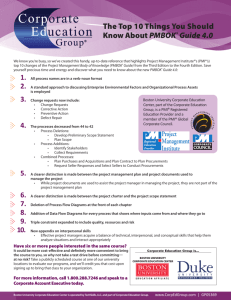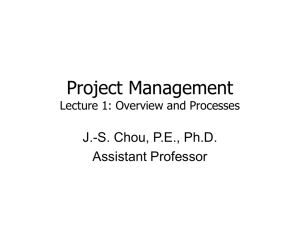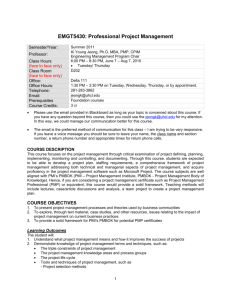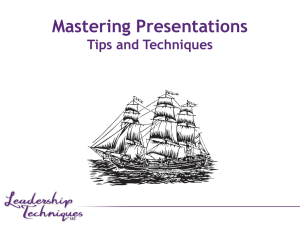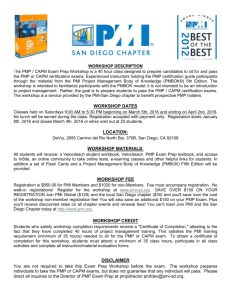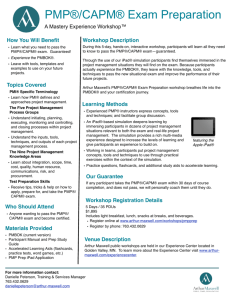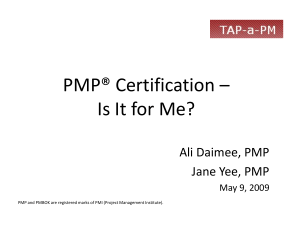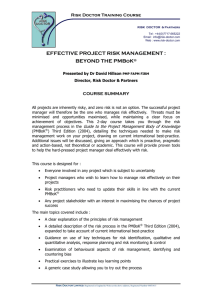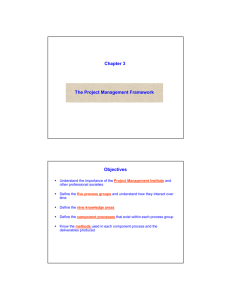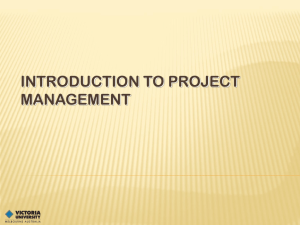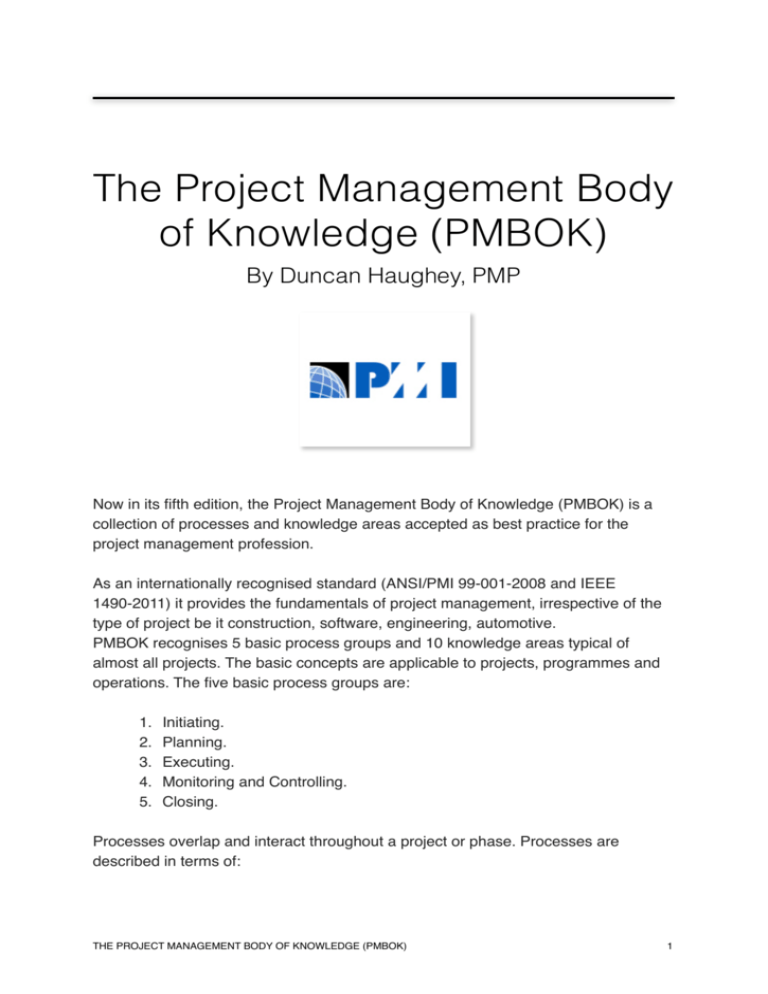
!
The Project Management Body
of Knowledge (PMBOK)
By Duncan Haughey, PMP
!
!
!
!
!
!
!
!
!
!
Now in its fifth edition, the Project Management Body of Knowledge (PMBOK) is a
collection of processes and knowledge areas accepted as best practice for the
project management profession.!
!
As an internationally recognised standard (ANSI/PMI 99-001-2008 and IEEE
1490-2011) it provides the fundamentals of project management, irrespective of the
type of project be it construction, software, engineering, automotive.!
PMBOK recognises 5 basic process groups and 10 knowledge areas typical of
almost all projects. The basic concepts are applicable to projects, programmes and
operations. The five basic process groups are:!
!
!
1.
2.
3.
4.
5.
Initiating.!
Planning.!
Executing.!
Monitoring and Controlling.!
Closing.!
Processes overlap and interact throughout a project or phase. Processes are
described in terms of:!
!
THE PROJECT MANAGEMENT BODY OF KNOWLEDGE (PMBOK)
1
!
• Inputs (documents, plans, designs, etc.).!
• Tools and Techniques (mechanisms applied to inputs).!
• Outputs (documents, products, etc.).!
!
The ten knowledge areas are:!
!
!
1. Project Integration Management.!
2. Project Scope Management.!
3. Project Time Management.!
4. Project Cost Management.!
5. Project Quality Management.!
6. Project Human Resource Management.!
7. Project Communications Management.!
8. Project Risk Management.!
9. Project Procurement Management.!
10. Project Stakeholder Management (added in the 5th edition).!
Each knowledge area contains some or all of the project management processes.
For example, Project Procurement Management includes:!
!
!
•
•
•
•
Plan Procurements.!
Conduct Procurements.!
Administer Procurements.!
Close Procurements.!
Much of PMBOK is unique to project management, for example, critical path and
work breakdown structure (WBS). Some areas overlap with other management
disciplines. General management also includes planning, organising, staffing,
executing and controlling the operations of an organisation. Financial forecasting,
organisational behaviour and planning techniques are also similar.!
!
CAPM and PMP!
The Project Management Institute (PMI) is the publisher of PMBOK (now in its fifth
edition) and offers two levels of certification:!
A Certified Associate in Project Management (CAPM) has demonstrated a common
base of knowledge and terms in the field of project management. It requires a
secondary degree (high school diploma or global equivalent) and either 1500 hours
of work on a project team or 23 contact hours of formal education in project
management.!
THE PROJECT MANAGEMENT BODY OF KNOWLEDGE (PMBOK)
2
!
A Project Management Professional (PMP) has met specific education and
experience requirements, has agreed to adhere to a code of professional conduct
and has passed an examination designed to objectively assess and measure project
management knowledge. In addition, a PMP must satisfy continuing certification
requirements or lose the certification.!
!
As of February 2012, PMI reported over 378,749 members, with 472,799 active
Project Management Professionals (PMP) and 16,939 active Certified Associate in
Project Managements (CAPM).¹ Over 44,000 PMP certifications expire annually; a
PMP must document ongoing project management experience and education every
three years to keep their certification current.!
!
References!
¹ PMI Today Magazine, April 2012.
THE PROJECT MANAGEMENT BODY OF KNOWLEDGE (PMBOK)
3
About Project Smart!
!
Project Smart is the project management resource that helps managers at all levels
improve their performance. We provide an important knowledge base for those
involved in managing projects of all kinds.!
!
More information about project management can be found on our website
www.projectsmart.co.uk!
!
!
!
!
!
!
!
!
!
!
!
!
!
!
!
!
!
!
!
!
!
!
!
!
!
!
!
!
!
!
!
!
!
!
!
!
Copyright © 2014 by Project Smart. All rights reserved.
THE PROJECT MANAGEMENT BODY OF KNOWLEDGE (PMBOK)
4

